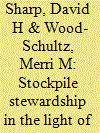| Srl | Item |
| 1 |
ID:
099708


|
|
|
|
|
| Publication |
2010.
|
| Summary/Abstract |
A limited resumption of nuclear testing is needed for effective nuclear deterrence. Nuclear testing is necessary to maintain an acceptable level of confidence in the current U.S. stockpile, enable modifications of legacy nuclear weapons that may be required to meet emerging stockpile requirements, support a prudent nuclear arms reduction program, and confirm by actual demonstration that we have the nuclear weapons design and manufacturing skills we think we have.
|
|
|
|
|
|
|
|
|
|
|
|
|
|
|
|
| 2 |
ID:
156930


|
|
|
|
|
| Summary/Abstract |
Uncontrolled risk is inherent in any program that lacks a proven means for revealing improper system performance, and the U.S. Stockpile Stewardship Program (SSP) is no exception. The downside of uncontrolled risk has been illustrated by the outcome of the National Ignition Campaign (NIC), a part of the Inertial Confinement Fusion (ICF) Program that has long been characterized as a crucial adjunct to the U.S. nuclear weapons program. For most of its duration, the NIC utilized simulations and partial-system experiments at several facilities, adding full-system experiments at the National Ignition Facility (NIF) only at the very end of the program. Uncontrolled risk was present in the program while those experiments were absent. That risk materialized when failure to achieve fusion capsule ignition was repeatedly and conclusively demonstrated in full-system experiments. For the SSP, the corresponding risk is that expectations concerning the safety, performance, and reliability of weapons in the stockpile are significantly incorrect. The only proven way of controlling that risk—finding out whether the expectations are wrong—requires nuclear testing. In its absence, this risk is not controlled by the SSP. The ongoing presence of uncontrolled risk in the U.S. nuclear stockpile leads inevitably to uncertainty in the effectiveness of the U.S. nuclear deterrent. None of the potential consequences of that uncertainty, one of which is a decrease in the deterrent's effectiveness, are beneficial to the United States or those who rely on its nuclear umbrella.
|
|
|
|
|
|
|
|
|
|
|
|
|
|
|
|